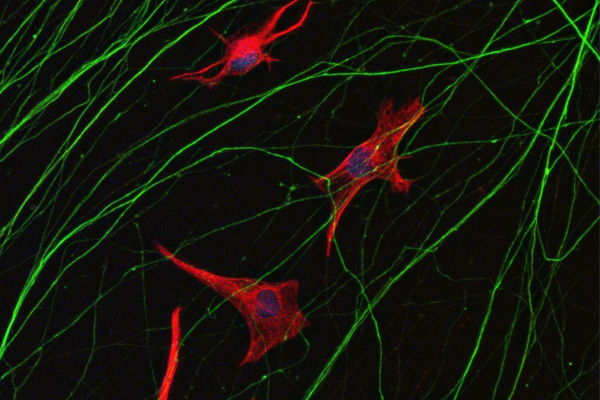
Researchers identify new potential therapeutic target for ALS
Amyotrophic lateral sclerosis (ALS) is a devastating neurodegenerative disease that affects motor neurons. The average life span after diagnosis is two to five years. A collaborative research effort led by the team of Prof. Ludo Van Den Bosch (VIB-KU Leuven) now revealed a potential new therapeutic target for ALS. The study, published in Cell Reports, shows that downregulating a specific enzyme, EGLN2, protects motor neurons and mitigates ALS symptoms in different animal models.
Amyotrophic lateral sclerosis (ALS), also known as Lou Gehrig’s disease, is the most common degenerative motor neuron disease in adults. It is characterized by a selective loss of motor neurons, resulting in progressive muscle weakness and paralysis, as well as swallowing and speech difficulties. Patients usually succumb to the disease within 2 to 5 years after diagnosis. Despite extensive research, there are currently no effective treatments to halt or reverse the progression of the disease.
.png)
From cancer to ALS research
Oxidative stress, metabolic dysfunction, and neuroinflammation are well-known hallmarks of ALS, which gave the researchers a target for their quest to understand the disease: a group of enzymes called EGLNs, metabolic sensors that regulate both cellular inflammation and metabolism.
Previously, the lab of Prof. Peter Carmeliet from the VIB-KU Leuven Center for Cancer Biology explored the role of the EGLN2 enzyme in cells experiencing low oxygen levels. The research demonstrated that inhibiting EGLN2 protected muscle cells, liver cells, and cortical neurons against oxidative stress. This prompted further study into its potential protective effects on motor neurons. Building on this work and in collaboration with the lab of Prof. Bart De Strooper, the Van Den Bosch team at the VIB-KU Leuven Center for Brain & Disease Research investigated the enzyme's relevance to ALS.
A potential therapeutic target
The researchers discovered that downregulating EGLN2 protects motor neurons and can mitigate the ALS phenotype in both zebrafish and mouse models. They also found that EGLN2 influences the pro-inflammatory cascade in astrocytes, a type of brain cell that supports motor neurons. These findings suggest that targeting EGLN2 could potentially reduce inflammation and slow down the progression of ALS.
“We used a multi-model approach to investigate the effects of EGLN2 in different cell types,” says Christine Germeys, first author of the study. “We included zebrafish, mice, and induced pluripotent stem cells (iPSCs) from an ALS patient and used single-nuclei RNA sequencing to understand the underlying processes behind EGLN2 regulation.”
This approach, a collaboration with the VIB Nucleomics Core and the Single Cell expertise unit, allowed them to examine changes in gene expression at the level of individual cells, providing a detailed view of how EGLN2 influences disease progression.
"Targeting EGLN2 could represent a promising therapeutic strategy for ALS," says Prof. Ludo Van Den Bosch. "While further research is needed, this discovery brings us closer to understanding how to slow or prevent this devastating disease."
Publication
Targeting EGLN2/PHD1 protects motor neurons and normalizes the astrocytic interferon response. Germeys, Vandoorne, et al. Cell Reports, 2024. DOI: 10.1016/j.celrep.2024.114719
Funding
The research (team) was supported by the Research Foundation Flanders (FWO), ALS Liga Belgium, the Generet Award for Rare Diseases, the Methusalem funding, the Agency for Innovation by Science and Technology, the E. von Behring Chair for Neuromuscular and Neurodegenerative Disorders, the Fund ‘Een Hart voor ALS’, the Wilhelm Schulthess Foundation and the 'Laevers Fund for ALS Research'.
India Jane Wise
Joran Lauwers
About the VIB-KU Leuven Center for Brain & Disease Research
Scientists at the VIB-KU Leuven Center for Brain & Disease study how brain cells are organized and how they communicate with each other. These mechanisms reveal and provide insights into what goes wrong in brain diseases such as Alzheimer's, Parkinson's, ALS, and dystonia. This basic work should ultimately lead to new drugs for use against these currently incurable diseases.


